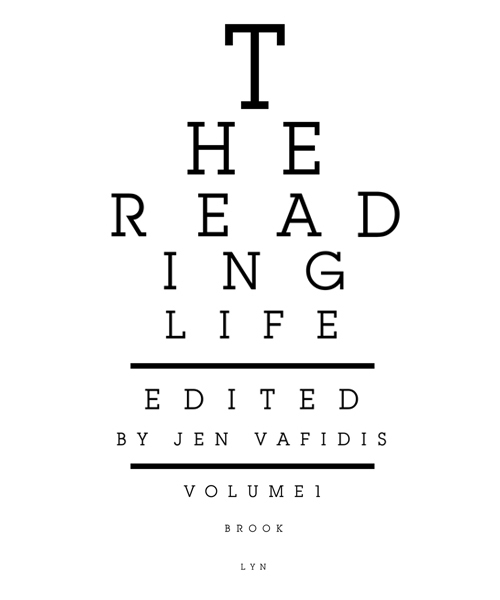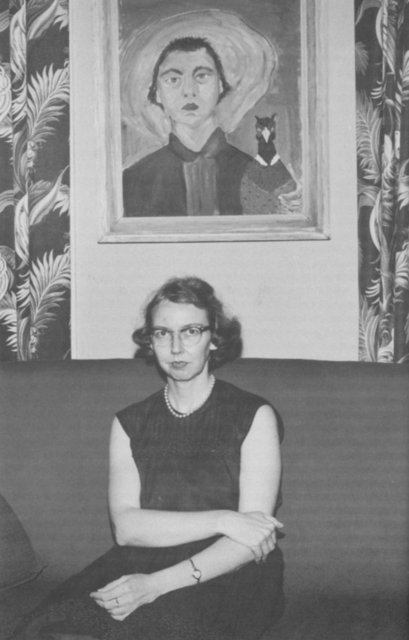I told many people the story of the suitcase lady. After I met her, I wrote the story out in an email, and I copied and pasted that into other emails, to others who find themselves saddled with my daily correspondence. Weeks later I was still talking about it. On a train leaving San Francisco on Christmas Eve, my hand held up to shield the mid-day sun, I heard myself ask my dad, as a rhetorical ending to the story, when it was advisable not to empathize with someone else. When, if at all, are you obligated to do something for a stranger? Which is harsh, when you think about it, but look. The story of the suitcase lady begins with Flannery O’Connor.
The day began with rereading “The Life You Save May Be Your Own,” one of the few I did not discuss in my now completely embarrassing undergraduate thesis. My obsession with her at the age of 21, although not at its peak, was certainly at its most unmanageable. I would stay up all night thumbing through the omnibus of O’Connor’s short fiction, and when I did sleep, it wasn’t restful. I talk in my sleep anyway (I’m sure I quoted some strange lines), but I started sleepwalking, too, and locking my door to be sure I wouldn’t wander outside.
Yet I didn’t remember this story. I thought, seeing a link to it in my Twitter feed, that this was the one about the idiot woman walking up the stairs and not realizing she’s pregnant.
It’s not. This story is about a woman who meets a tramp looking to do work on her house for food and shelter. (Cheeky: he says he’s a carpenter.) The woman asks him where he’s from. He says:
“Nowadays, people’ll do anything anyways. I can tell you my name is Tom T. Shiftlet and I come from Tarwater, Tennessee, but you never have seen me before: how you know I ain’t lying? How you know my name ain’t Aaron Sparks, lady, and I come from Singleberry, Georgia, or how you know it’s not George Speeds and I come from Lucy, Alabama, or how you know I ain’t Thompson Bright from Toolafalls, Mississippi?”
The woman mutters that she doesn’t know anything about this guy. His reply:
“Lady,” he said, “people don’t care how they lie. Maybe the best I can tell you is, I’m a man; but listen lady,” he said and paused and made his tone more ominous still, “what is a man?”
The woman is somehow swayed by this and agrees to let him work, and the tramp fixes up her busted car, only to steal it. How? By pretending to be interested in marrying her mentally disabled daughter and wishing to take her on a nice honeymoon. The woman assents, the two are married, and he’s off: leaving the disabled girl somewhere on the road, being followed by a storm fit for the Book of Job, and having no remorse whatsoever.
As a parable, it doesn’t do anything. But as a story? You have to read the whole thing even if you sit down only for the first few paragraphs, and that is what I did. Then I walked around in the cold with a cup of coffee and a friend, and we went to a movie, and I had to leave before it ended because I was late to a dinner party uptown. Running up the stairs of my host’s building, I passed a woman standing in front of a closed apartment door. Suitcases of various sizes surrounded her, and she was wearing a hat, several layers of clothing, and sunglasses on top of the hat.
“Do you live here?” she asked. I said no, and I continued up the stairs.
Shortly after the final course, two friends similarly far from their homes and I decided to leave together, baggies of leftovers in hand. Rain had started to fall. I waited with one friend in the doorframe while the other finished a conversation upstairs. The suitcase lady was on the sidewalk with no umbrella.
“Excuse me,” she said. “Could you help me move these bags? I can’t move them by myself.”
“Where do you need to go?” I asked, walking toward her in the rain.
“Somewhere safe,” she said.
Here I assumed a few things. The first assumption: this woman was older than me. I’m not good with ages; I’m actually terrible at them; but I jumped to this conclusion in an effort to be more articulate and less obvious than my subconscious assumption, which was that this woman was not like me in a number of ways, some too hidden for me to see, others too mired in class for me to address without vestigial guilt.
The second: this woman was in trouble, and it was a domestic abuse situation, which now seems totally wild, but listen. If a woman with an excessive amount of suitcases and several outfits on at once is telling you she needs to go somewhere safe, on a Sunday night, in a nice neighborhood, you don’t think she wants to know if she should check out the Standard.
First plan: I told her that I would call 311 and find some women’s shelters, and we would put her in a cab and send her to one of them. But before I do that, would she like some food? She nodded. My friend and I gave her some muffins from our bags of leftovers. Each bite was oxygen.
The first shelter I found needed to know the age of the suitcase lady. I asked. She mumbled, but I heard: “21.” First assumption: debunked. Second assumption: wavering. The shelter only admitted women over the age of 32, by itself an absurdity in an already absurd situation.
The next place I tried was on the Lower East Side. Perfect. I told the suitcase lady my plan.
“Where’s that?” she asked, suddenly more distressed. She had trouble with the street names.
“I don’t want to go there. I want to know where I am,” she said definitively, and by this point our other friend had joined us and wanted to know where, exactly, she would know where she was. She didn’t answer.
“This other place I found is in the Bronx,” I said. “Do you know the Bronx? The streets are numbered.” She looked at me with more panic than before.
“I don’t want to leave this borough,” she said. One friend got on the phone to find more places to offer her; another started walking down the street to see if he could find a cab; and I was left with the suitcase lady, who was now looking at me, and I was looking at her. She was giving me a look that was far too emotional for strangers to exchange, and I was doing my best not to be embarrassed.
“What’s the worst thing that has ever happened to you?” she asked me after a minute or so of this.
“I don’t think that’s fair,” I said.
“It will never be fair,” she said, taking us firmly to the territory of hysterical fiction. “What’s the worst thing that has ever happened to you?”
I told her what I thought was the worst thing that ever happened to me.
“How did you get over that?” she asked.
“Time. Talking.”
She shook her head. “Talking never helped me.” She said some other things too quietly for me to hear, and then she asked at full voice, “When did you learn to empathize with others?”
“I don’t know,” I replied truthfully. And she was off: talking about how she didn’t know how to relate to others, talking about how nobody could really relate to anyone, and wasn’t it amazing how your whole life could change and turn upside down without you knowing about it, like a key that you put into a lock and can’t turn.
Third assumption: this person is mentally ill. She spoke vaguely about what she called “her situation,” with three-dollar words and in mediocre metaphors. Second plan: just get this person in a cab.
But my friend returned with another idea: zero shelters in Manhattan were picking up the phone, but one clinic on the East side would take her. She reacted with even more panic.
“I don’t want a case worker,” she said. We argued. How much money did she have on her anyway? Five dollars, she said.
The rain had gotten steadier. We went into the vestibule for shelter, four people and several suitcases that we lifted up the steps for her. (My friend remarked later that these suitcases were nearly impossible for him to lift.) Our frustration came to the surface, and she began to shut down.
“Can you guys give us a minute?” I said to my friends. They obliged.
“It’s getting really hard to find a situation that’s ideal for you,” I said.
“The ideal,” she began, “doesn’t exist. I’ll just end up right where I am. Anything you do for me tonight will be temporary.”
She was in the middle of a monologue that hinted at her having a child when two women I had seen earlier in the evening came into the vestibule with us. One held keys. The other had pink hair. Again, I’m not good with ages.
“What are you doing?” the one with keys asked the suitcase woman. “You’ve been loitering outside my building for hours.”
The suitcase woman looked down. The one with pink hair looked at me. I have never been good with ignoring confrontation.
“Look, I don’t know what’s going on, but…” I began, and the one with keys interrupted me with unmistakable anger.
“Yeah,” she said. “With all due respect, you don’t.” She theatrically turned away from us, let her pink-haired friend in, and made a big show out of locking the door, quite needlessly, behind her.
I decided then that I could only repress my emotions in favor of emotional support for ten more minutes, tops, and I told her we were going to put her in a cab and she could go wherever she wanted. It was going to be fine.
“It’s not going to be fine,” she protested.
“Well, it’s a good lie,” I said.
Upon seeing a yellow cab pull up, she asked us to call for a livery cab instead, insisting that she didn’t trust yellow cab drivers, and I shook my head. My friends and I sent her off with money, and we didn’t stop talking about her the whole subway ride home. I couldn’t sleep. I wrote the story out in an email, and I thought about lying until two in the morning, when I fell asleep.
Follow Vol. 1 Brooklyn on Twitter, Facebook, Google + and our Tumblr.



3 comments